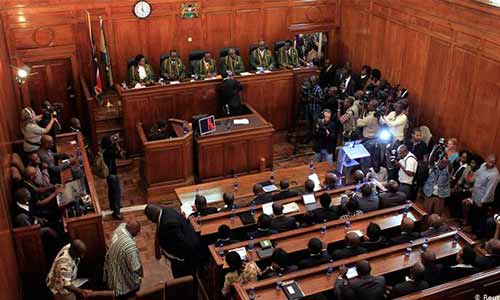Kenyan High Court rules that lawyers are essential workers during COVID-19 lockdown
A Kenyan High Court in Nairobi, the country’s capital, has ruled that lawyers in the country be exempted from the curfew order imposed by the government to curtail the spread of COVID-19.

A Kenyan High Court in Nairobi, the country’s capital, has ruled that lawyers in the country be exempted from the curfew order imposed by the government to curtail the spread of COVID-19.
In a petition raised by the Law Society of Kenya and supported by Kenya National Commission on Human Rights, International Federation of Women Lawyers (FIDA-Kenya), Independent Police Oversight Authority (IPOA) and Party Legal Advice Centre, it requested that the justice system and legal representation be listed as essential services providers.
It argued that in enforcing the lockdown, the Police tasked with the duty has made several arrests of which the persons need representation and the COVID-19 shouldn’t abdicate the operationality of the judicial system and functionality of legal officers.
“It is the petitioner’s case that the curfew order is contrary to Articles 49 and 50 of the Constitution as legal representation has been omitted from the list of essential services despite the fact that those arrested under the curfew order require legal representation.” the document read in part.
In response the respondents which comprise of; Hillary Mutyambai, Inspector General of National Police Service, Fred Matiangi, Cabinet Secretary for Interior and Coordination of National Government, Attorney General, The Honourable Chief Justice, Mutahi Kagwe, Cabinet Secretary for Health, submitted that individual members of the Petitioner can be exempted from the operation of the curfew on a case by case basis pursuant to Clause 4 of the curfew order
However, presiding on the case, the Judge of the high court, W. Korir established the need for lawyers to carry out their duties without restrictions, citing that advocates are not bound by only court duties but also to their clients, whom during case proceedings require visitation.
The judge therefore pronounced that the petitioner’s concern becomes more important when the manner in which the curfew has been enforced is taken into account and as such, lawyers are exempted from the curfew order.
In addition, the petitioner alongside its interested parties submitted that it makes no constitutional sense to exempt essential services like food retailers, pharmacies and supermarkets when public transport enabling the public to access these essential services is not included in the exemptions.
In its argument, the petitioner also faulted the premise in which the curfew order in the country is being effected and implemented, classifying it as illegal.
It also accused the police, tasked with enforcing the curfew, of using unreasonable force in enforcing the curfew order.
“The Petitioner asserts that the Curfew Order is “illegal, illegitimate and un-proportionate” as it is “blanket in scope and indefinite in length.
“The Petitioner also contends that the Curfew Order does not contain any reasons or rationale for the curfew. Further, that it limits rights and ascribes penal consequences without any legitimate aim.
“The Petitioner also asserts that the curfew order is ultra vires as it was established pursuant to Section 8 of the Public Order Act, Cap. 56 (“POA”), yet “public health emergencies” are governed by Section 36 of the Public Health Act, 2012 (“PHA”).” the court proceedings document read in part.
In opposition, the respondents submitted that the “Inspector General of Police avers that he did not issue any order to the National Police Service to unleash the so-called campaign of terror on members of the public.
He, nevertheless, deposes that no evidence has been adduced to support the allegations in the petitioner’s affidavit. It is also his averment that he cannot act upon the allegations of abuse of power by police officers as no complaint has been lodged in his office.”
Pronouncing judgement on the article raised, the Judge, Korir said that the Police must be held accountable for its actions, stating that the enforcers cannot beat people to ‘contain the virus’
“It appears that in confronting the coronavirus, which is by all means a faceless enemy, the police brought the law and order mentality to the fore. Diseases are not contained by visiting violence on members of the public. One cannot suppress or contain a virus by beating up people. The National Police Service must be held responsible and accountable for violating the rights to life and dignity among other rights,” the Judge said.
While Kenya is making headway and drawing distinctions in ensuring an effective partial lockdown order, the atmosphere is different in Nigeria.
For one, the lockdown order was extended by another fourteen days by President Muhammadu Buhari and while health workers such as doctors are listed as essential workers, there have been reports of doctors being harassed by security agents.
In a statement released on April 1, by the Nigerian Medical Association (NMA), and the Medical Guild, alleged undue “harassment” of medical doctors and other health workers in Lagos, describing the position of authorities on doctor’s identification card not sufficient to enable movement, as ‘uncomplimentary.’
Meanwhile, the Federal Capital Territory Administration (FCTA) has directed that mobile courts will now be activated to try all violators of the lockdown directive across the FCT.


